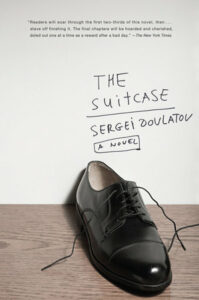Sergei Dovlatov
Sergei Dovlatov was born in Ufa, Bashkiria (U.S.S.R.), in 1941. He dropped out of the University of Leningrad after two years and was drafted into the army, serving as a guard in high–security prison camps. In 1965 he began to work as a journalist, first in Leningrad and then in Tallinn, Estonia. After a period of intense harassment by the authorities, he emigrated to the United States in 1978. He lived in New York until his death in 1990.
Subscribe to our newsletter for news & events from Counterpoint Press.
Books
The Suitcase
A Novel
Sergei Dovlatov's subtle, dark–edged humor and wry observations are in full force in The Suitcase as he examines eight objects—the items he brought with him in his luggage upon his emigration from the U.S.S.R. These seemingly undistinguished possessions, stuffed into a worn–out suitcase, take on a riotously funny life of their own as Dovlatov inventories the circumstances under which he acquired them, occasioning a brilliant series of interconnected tales: A poplin shirt evokes the bittersweet story of a courtship and marriage, while a pair of boots (of the kind only the Nomenklatura can afford) calls up the hilarious conclusion to an official banquet. Some driving gloves—remnants of Dovlatov's short–lived acting career—share space with neon–green crepe socks, reminders of a failed black–market scam. And in curious juxtaposition, the belt from a prison guard's uniform lies next to a stained jacket that once belonged to Fernand Léger.Imbued with a comic nostalgia overlaid with Dovlatov's characteristically dry wit, The Suitcase is an intensely human, delightfully ironic novel from "the finest Soviet satirist to appear in English since Vladimir Voinovich."
Pushkin Hills
An unsuccessful writer and an inveterate alcoholic, Boris Alikhanov has recently divorced his wife Tatyana, and he is running out of money. The prospect of a summer job as a tour guide at the Pushkin Hills Preserve offers him hope of regaining some balance in life as his wife makes plans to emigrate to the West with their daughter Masha, but during Alikhanov's stay in the rural estate of Mikhaylovskoye, his life continues to unravel.Populated with unforgettable characters—including Alikhanov's fellow guides Mitrofanov and Pototsky, and the KGB officer Belyaev—Pushkin Hills ranks among Dovlatov's renowned works The Suitcase and The Zone as his most personal and poignant portrayal of the Russian attitude towards life and art.
The Zone
A Prison Camp Guard's Story
Written in Sergei Dovlatov's unique voice and unmatched style, The Zone is a satirical novelization of Dovlatov's time as a prison guard for the Soviet Army in the early 1960s. Snapshots of the prison are juxtaposed with the narrator's letters to Igor Markovich of Hermitage Press in which he urges Igor to publish the very book we're reading. As Igor receives portions of the prison camp manuscript, so too does the reader.Arguably Dovlatov's most significant work, The Zone illuminates the twisted absurdity of the life of a prison guard: "Almost any prisoner would have been suited to the role of a guard. Almost any guard deserved a prison term." Full of Dovlatov's trademark dark humor and dry wit, The Zone's narrator is an extension of his author, and the book fittingly begins with the following disclaimer: "The names, events, and dates given here are all real. I invented only those details that were not essential. Therefore, any resemblance between the characters in this book and living people is intentional and malicious. And all fictionalizing was unexpected and accidental." What follows is a complex novel that captures two sides of Dovlatov: the writer and the man.

Catapult | Counterpoint | Soft Skull
1140 Broadway #706
New York, NY 10001
646.926.0805 | info@counterpointpress.com







